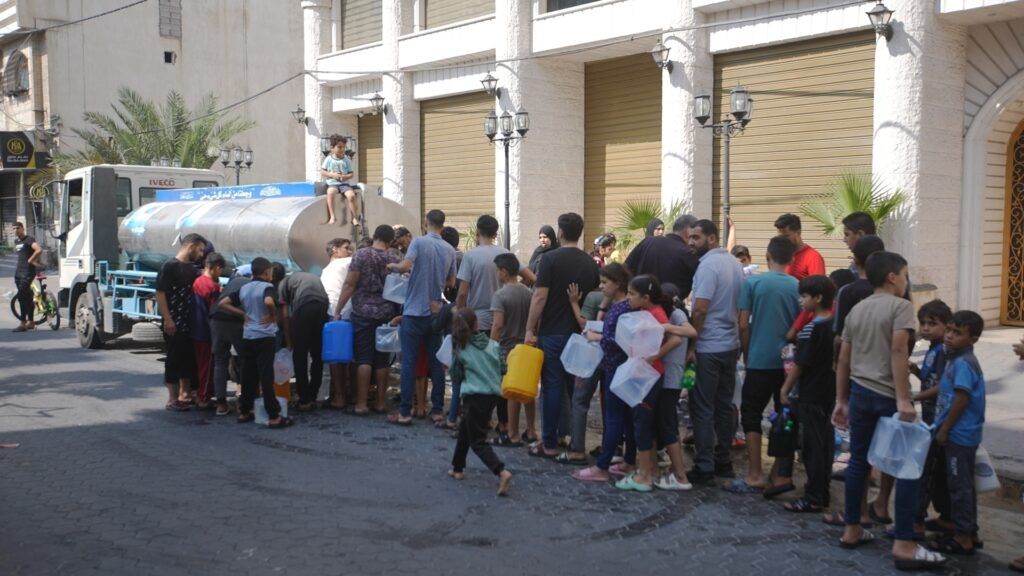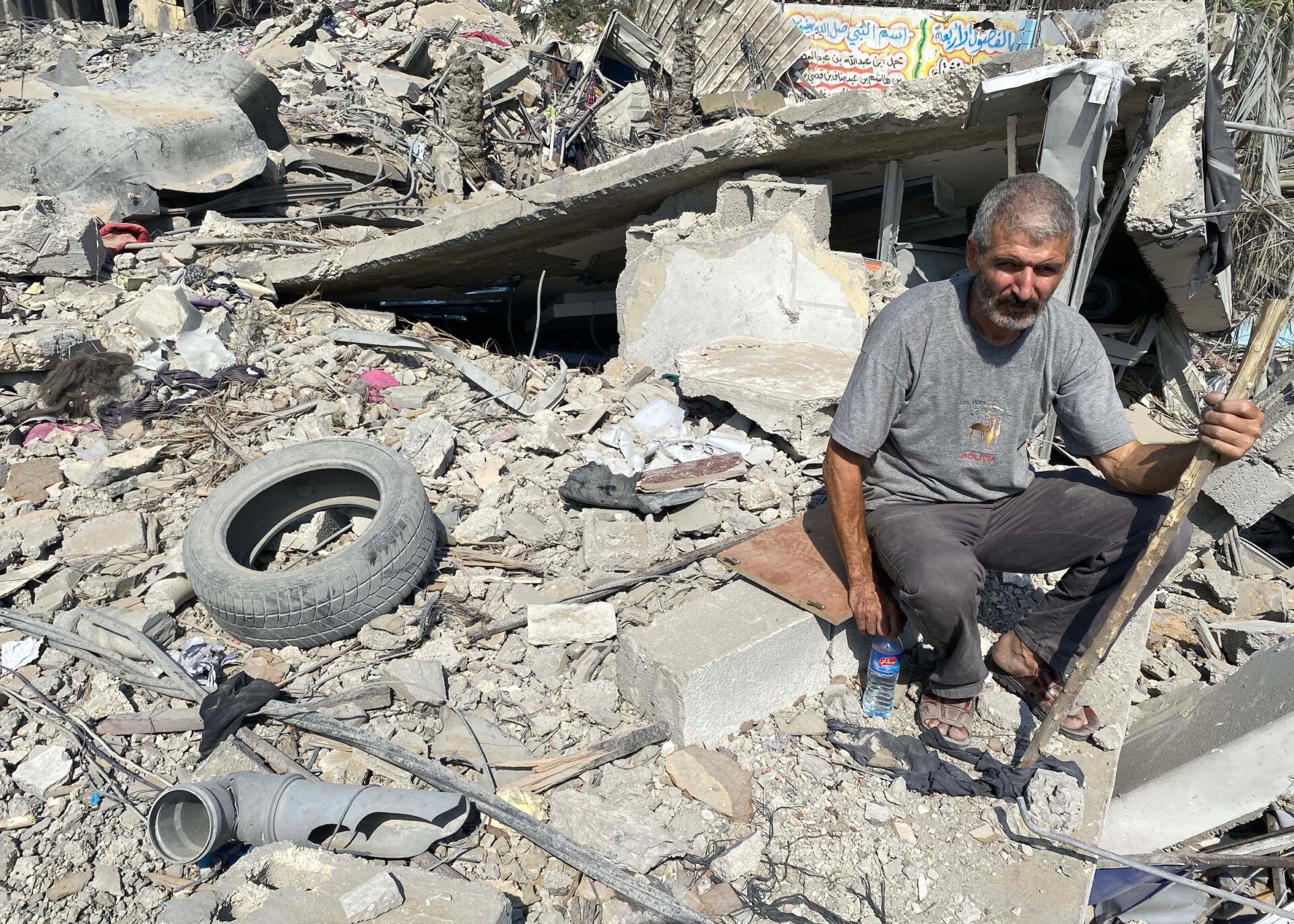The people of Gaza need a water ceasefire
By Reem Abu Shomar, Mark Zeitoun | November 15, 2023
 Palestinians queue for water in Gaza. Since October 7, 2023, the escalating crisis in Israel and the occupied Palestinian territory has caused large numbers of civilian deaths and injuries. In the Gaza Strip, airstrikes and a lack of medical supplies, food, water and fuel have virtually depleted an already under-resourced health system. (Photo: WHO)
Palestinians queue for water in Gaza. Since October 7, 2023, the escalating crisis in Israel and the occupied Palestinian territory has caused large numbers of civilian deaths and injuries. In the Gaza Strip, airstrikes and a lack of medical supplies, food, water and fuel have virtually depleted an already under-resourced health system. (Photo: WHO)
The grainy night-time video footage from northern Gaza shows a flood coursing down the streets. Four weeks into Israel’s bombing campaign, a critical water tank was hit in the Jabalia refugee camp, sending the contents of the reservoir streaming. Even amidst everything they are going through, seeing the water flow by them was particularly distressing to residents of Gaza who face a severe shortage of clean drinking water. It was particularly cruel to mothers who are scrambling to keep themselves and their children hydrated, alive, and healthy. Other water tanks have also been hit and made inoperable, including those that provide water to hospitals.
This is the weaponization of water, a process that turns an essential resource into a military or political tool. And it goes against every norm the world has created to safeguard humanity during war. Only a ceasefire to end the fighting will stop the misery and open the door to discussions that address the root of this conflict.
Gaza was once known for its water. The shallow sand wells provided an ample supply of the sweet, life-giving water that sustained Gaza’s residents—and the conquerors and armies that passed through the region, from Nebuchadnezzar II in 600 BC to the British during World War I—for thousands of years.
But Gaza’s aquifer has been under immense pressure since it was forced to support hundreds of thousands of Palestinians who were displaced from British Mandate Palestine during the Nakba (catastrophe) and creation of the State of Israel in 1948. The population pressure increased after Israel occupied Gaza and the West Bank in 1967 and began a policy of ‘de-development,’ adding fuel to the Palestinian will for self-determination.
Even before the latest round of bloodletting in the Israeli-Palestinian conflict began in October, virtually all of the water in Gaza was contaminated and unsafe to drink. A study published earlier this year found 97 percent of Gaza’s groundwater exceeded the recommended nitrate and chloride levels set by the World Health Organization’s guidelines for drinking water. Worse, a recent epidemiological study conducted by one of the authors of this article found shocking amounts of antimicrobial resistant bacteria—or ‘superbugs’—in the water used by hospitals, and even more in the sewage and wastewater leaving them. This means that in Gaza, if the block of concrete or piece of shrapnel doesn’t kill you immediately, the infection that refuses to respond to antibiotics will.
When the 1995 Oslo Accord was struck between Israel and the Palestine Liberation Organization, many hoped that a Palestinian state on the West Bank and Gaza would thrive beside Israel. Despite the efforts of the Oslo-created Palestinian Water Authority and Coastal Management Water Utility to play the cards they were dealt, seawater continued to seep into the aquifer from the Mediterranean, and untreated sewage percolated in from the top.
According to a 2009 World Bank study, the biggest restrictions to sustainable development of the water sector in the West Bank and Gaza were “exogenous,” stemming from the Oslo political process and the Israeli occupation. In Gaza, a series of Israeli attacks during violent skirmishes with Hamas from 2008 to 2021 forced the authorities into a reactive cycle of rebuilding water infrastructure the attacks had damaged, abandoning more forward-looking plans for resilient systems, artificial aquifer recharge, and major reverse-osmosis plants to desalinate the sea.
People had to rely on unregulated desalination plants or bottled water imported via Egypt for drinking water, on private wells for agriculture, and on the municipal supply (about 13 percent of which was purchased from Israel) for household chores. This was the precarious state of water in Gaza in September 2023, just before the latest round of terror inflicted on civilians by Hamas and Israel.

The current crisis. Israel’s “total siege” bars most fuel, water, and food from entering Gaza, creating a desperate situation. (Along with hundreds of thousands of others, one of the authors of this article is sheltering in southern Gaza after her home in the north was destroyed and spends much of her time securing water for her family.) The World Health Organization says people are down to less than a gallon of water per day, when 20 gallons are required to wash and live in dignity. Thousands of people displaced to camps are forced to share just a few toilets. Sewage plants have run out of fuel. Untreated wastewater now mixes with the heavy metals from the modern munitions raining down on the strip and is percolating into the aquifer. The effects of the bombing have reverberated so widely that tens of thousands of toddlers are suffering from acute diarrhea. It seems just a matter of time before cholera and other waterborne diseases course through those who survive.
What is happening is a “crime against humanity,” according to the UN Special Rapporteur on the Human Right to Water and Sewage, and the situation is “catastrophic.”
The Rules of War—or International Humanitarian Law—were created to prevent such suffering from ever recurring after the horrors in the trenches during World War I. These rules oblige Israel, as the occupying power, to take all the measures in its power to restore and ensure, as far as possible, public order and civil life. Apart from defining the rights of prisoners of war and outlawing torture, these rules call for the protection of “objects indispensable to the survival of the civilian population” (CIHL, Rule 54, and UN Security Council Resolution 2573 (2021), para.3.) and the repair crews trying to maintain them (CIHL, Rule 56).
The international norm most relevant at the time this article was written is that of a “water ceasefire” (Geneva Principles, Principle 17 (4)). This calls for parties to the conflict to negotiate safe passage of humanitarian relief personnel for water-related and other activities, as was arranged between Russia and Ukraine in 2014. The bulk of the rest of the world called for basically the same to happen in Gaza at the UN General Assembly only a few weeks ago.
A ceasefire would allow the discussions that will inevitably occur once the dust settles to begin. And it is in preparing for those discussions that the roots of the conflict may be examined. But the lessons of decades of diplomacy that were based more on hope than analysis must be learned.
Redressing a long history of water injustice. Any belief that two states could be created beside each other in this land must be grounded in these facts: All water sources in Israel, the West Bank, and Gaza cross one or another border. Sewage spilling into the sea in Gaza flows up the coast to the intake of desalination plants in Israel. Water pumped for Israeli settlements dries out the wells in Palestinian villages. It makes no sense to try to manage the water separately, and it is inhuman to deny it to an entire group of people. If ever there was a rationale to promote equal political rights and opportunity for everybody in this territory, it is water.
The Palestinian will for self-determination will not be stopped by the misery created by lack of water and water-borne disease. Today, the people of Gaza deserve respite from the bombs as they are forced to seek water and fuel to survive another day. Like everyone everywhere, they are entitled to clean water, and to a complete stop to its perverse use as a weapon. Apart from the lives it would save, a water ceasefire would open the door just a crack to begin to discuss the root causes of the Palestinian-Israeli conflict, reconcile historic injustices, dissolve chauvinist ideologies, and heal wounds.
Together, we make the world safer.
The Bulletin elevates expert voices above the noise. But as an independent nonprofit organization, our operations depend on the support of readers like you. Help us continue to deliver quality journalism that holds leaders accountable. Your support of our work at any level is important. In return, we promise our coverage will be understandable, influential, vigilant, solution-oriented, and fair-minded. Together we can make a difference.
Keywords: Gaza, Israel, Palestine, conflict and climate, war, water
Topics: Climate Change, Special Topics















